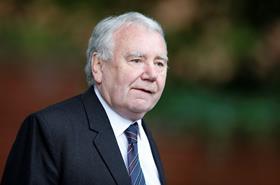The solicitor acting for South Yorkshire Police in the Hillsborough inquiry has been cleared of trying to pervert the course of justice in a ruling dealing in detail with a lawyer’s professional duties.
Mr Justice William Davis ruled that Peter Metcalf, who is now retired, had no case to answer and that the jury should acquit.
The judge acknowledged the strength of feeling in the case following the death of 96 people at at the Hillsborough ground in Sheffield iun 1989. But he rules that there was insufficient evidence to support the charges faced by Metcalf and two former police officers.

The court heard that Metcalf had been instructed by insurers of South Yorkshire Police following the tragedy and advised on the public inquiry conducted in 1990 by Lord Justice Taylor.
It was alleged that Metcalf, along with the two former officers, was responsible for amending and altering witness accounts to pervert the course of justice. Metcalf also faced charges relating to civil proceedings in 1990. Each defendant submitted there was insufficient evidence on any count.
Prosecutors said Metcalf and the two other defendants tried to minimise the blame heaped upon the police by altering accounts, knowing those accounts would inevitably feature in inquiries that would follow the disaster. Metcalf was alleged to have sent out draft statements setting out what he wanted the officers to say.
The judge ruled that Metcalf’s invitation to officers to review the evidence they gave to the Taylor Inquiry had no tendency to pervert the course of public justice. Whatever the effects of the solicitor’s acts and whatever culpability there might have been on his part, it did not constitute the criminal offence with which he was charged as this did not apply to the public inquiry.
Prosecutors tried to argue that Metcalf had a duty of candour to the Taylor inquiry and that he had a conflict of interest by representing the interests of the police force and individual officers. Legal regulatory expert Gregory Treverton-Jones QC, called as a prosecution witness, told the court that Metcalf was in breach of his professional duty as a solicitor.
In his ruling, the judge stated that a solicitor’s duty to the court took precedence over that to his client, and that they must not mislead the court’. But he also said: ‘In conventional proceedings a solicitor may be in a position where he realises that the court is acting on a false basis. Provided the solicitor does not contribute to the misapprehension of the court, he has no duty to correct the court or to draw the court’s attention to the true position.
‘In relation to the calling of witnesses, the solicitor is under no duty to call a witness whom he knows will correct any misapprehension if to do so will not be in the best interests of his client.’
This article is now closed for comment.



























15 Readers' comments